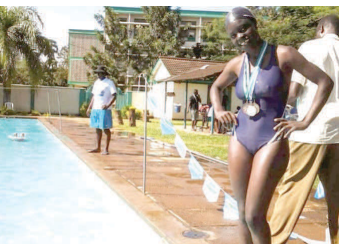How campus swimming queen faced her fears and triumphed

Born and raised in Kiambu, Queenter Achieng never knew that swimming will one day be the reason for her success. But with 17 medals to her name from both international and local competitions, all won during her university days, Queenter is a campus queen when it comes to this water sport.
She is currently giving back by mentoring both beginners and upcoming professional swimmers.
“Queenter loved arts, music and participated in various school music events. However, she was introduced to swimming when she joined Lavington Primary School in 2003, in Class Six.
The school offered swimming classes,” begins her husband Hannington Okoth about her journey in swimming.
Swimming lessons
“However, her swimming lessons were short-lived because her family had to move to their rural home in Homa Bay county in 2004.
Her last swimming lesson was a scary one. The trainer offered beginners a test where they were to swim in the deep end.
It turned out to be her worst experience. Queenter was scared and she didn’t make it on her own. She had to be assisted. This made her hate swimming,” he shares.
In her new school – Obera Primary School in Homabay county, Queenter was active in athletics and soccer. She earned various awards in girls’ soccer, which really motivated her to explore more in sports.
“She sat her Kenya Certificate of Primary Education (KCPE) in 2005 and joined Asumbi Girls High School. Here she found a vibrant soccer team, which she immediately joined while in Form One.
Initially, she had played as a striker. However, when her coach discovered that Queenter could also strike as a winger, she made her play both positions 11 and seven,” he says.
Soccer was more competitive in secondary school. “That meant there was more intense training, commitment and the need to master discipline. But my wife’s love for sports grew more,” he says.
She completed secondary school in 2009 and enrolled at University of Nairobi in 2011 for a Bachelor of Arts degree. Little did she know that her passion for swimming would be reignited in campus.
“During her first week in campus, Queenter strolled around checking out the facilities available, especially for sports. It was the first time she had seen such a huge pool of 50 metres.
She also inquired about the soccer team and realised that the game was not as competitive as she had anticipated. So, she had to shift her interest to something else,” he says.
With an accessible large pool and extra time in her schedule, Queenter opted to learn how to swim from scratch.
“She would pack her costume when attending lectures and after class, she would pass by the pool and swim before heading back to the hostel. On days when she had one lecture, she would spend half of the day at the pool,” shares Okoth.
The dive
Watching and learning from other swimmers and also training with the swimming team on Tuesdays and Thursdays at 5pm, Queenter was so determined to swim across the pool that she discovered could do more.
“Okoth, one of her friends, was in the school swimming team and was really good. He took her through the swimming techniques and really helped her improve her skills,” narrates her husband.
By the time, Queenter was in her second semester, she had learnt to swim in the deep end and began training intensely to be a better, competitive swimmer.
Since swimming is more of an individual sport than team oriented, Queenter had to make extra effort to improve through dedication, time management and progress.
After she had participated in two inter-faculty competitions, one of the sports department coaches, Sebastian Okech, spotted her in 2012 and asked her to join the school team.
“When she told him that she had just been learning how to swim in campus, he was impressed. Many of the good swimmers had come from schools that had competitive swimming programmes and activities, so they came in ready to join the team.
Oketch offered to sponsor her for Life Guard Training at The Young Men’s Christian Association (YMCA), where she joined in 2014,” Okoth reveals.
The course was vital in improving her endurance as well as swimming techniques. “Every day was a learning experience and she had to learn something new.
The execution of every technique was important. The team’s coach was strict, but supportive. Apart from helping her improve her swimming skills, she learnt more on endurance and team collaboration,” he adds.
She participated in the All-African University games and in December 2014, the team went to Uganda and won silver and bronze medals. In 2015, she participated in East African games where she received a gold medal for 200 metres breaststroke.
“Winning is always incredible, but in sports, it’s fulfilling because it justifies the hard work and shows potential to do better. She is also grateful for the opportunity to represent her country and her campus in various swimming competitions. In total, she has won 17 awards,” Okoth reveals.
From beginner to instructor
Queenter was also elected captain for her team, nicknamed The Sharks.
Inspired by her mentor, the late Sam Oloo to become a trainer, in 2016 after campus, Queenter was determined to offer life-saving as well as safe swimming lessons.
She dedicated her efforts in training people how to swim and also mentoring upcoming professional swimmers.
“She worked closely as a coach with Kenya Swimming Enterprise and introduced many students to the world of swimming. She does personal training for adults as well as children.
Being a trainer is like being a teacher. It’s a passion-driven profession. She’s motivated by the idea that learning to swim is a basic life skill, which everyone should have. She’s also passionate about fitness and health,” says Okoth about his wife.
Queenter feels that swimming has been given little attention unlike other sports and that’s why aspiring beginners don’t have something to look up to.
“I know of private swimming clubs, but even with those, there are no programmes that motivate aspirations beyond institutional competitions. So, swimmers either venture into coaching or other competitive fields in sports. I want to mentor as many swimmers as I can. I aspire to start a swimming enterprise in future. Swimming programmes can also be effective in driving change in communities for those passionate about such initiatives,” says Queenter.
The swimming enthusiast met the love of her life in 2019 and after learning about her passion in swimming, he too began his lessons, being trained by his wife. Since then, Okoth has been supportive of his wife and believes that his will be an aquatic family.
“I wanted to learn swimming as a basic life skill and for recreational purposes in 2019. I didn’t know that my swimming instructor would become my wife in future,” he recalls.













